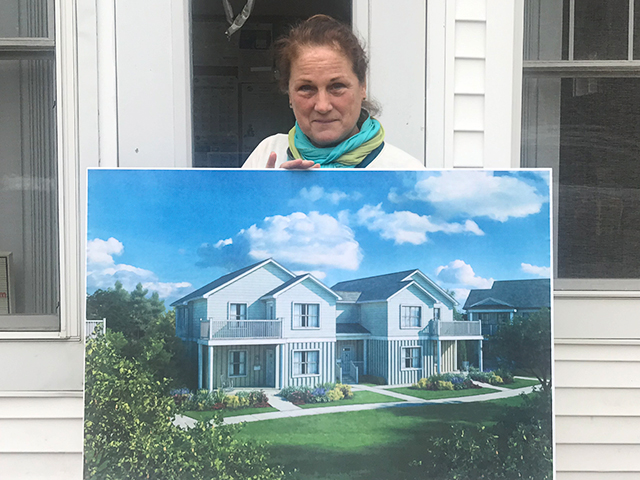By Jamie Bufalino
March 7, 2019
A groundbreaking ceremony for the 37-unit affordable housing complex to be built at 531 Montauk Highway in Amagansett will likely take place next month, said Catherine Casey, the executive director of the East Hampton Housing Authority on Monday. But before the festivities can begin, the housing authority and its partner, Georgica Green Ventures, have two major milestones to meet: They must secure a loan for construction financing and finalize a deal with a company that will purchase the tax credits New York State has allocated for the project.
“We can receive the tax credits, but since we’re a nonprofit and we don’t pay taxes, we can’t use them, so we partner with a corporation that has a tremendous tax liability,” Ms. Casey said. That corporation is likely to be Boston Financial Investment Management, a real estate investment company, said Ms. Casey. “But we’re still doing due diligence.”
New York State has allocated $7 million in funding for the project, as well as the tax credits.
The construction loan is necessary, Ms. Casey said, because the $7 million grant from the state is not awarded upfront. “The state says, ‘Yes, this money is a lock, but you will get it when you build this thing,’ ” she said. “Based on that commitment Georgica Green Ventures,” a development company that specializes in affordable housing, “can go out and borrow” the money needed for construction.
Ms. Casey is optimistic that the milestones will be reached by the end of this month.
“As soon as we sell those tax credits and close on the construction financing, we’re going to start building,” she said.
The East Hampton Town Planning Board approved the latest iteration of the site plan for the project on Jan. 23. The complex will consist of seven buildings with 12 one-bedroom, two-bedroom, and three-bedroom units, plus one with four bedrooms, as well as a common building with a laundry room and meeting room, 74 parking spaces, a sewage treatment plant, and a rain garden.
Each of the apartments will have ample storage space, said Ms. Casey, and bathrooms that are large enough to accommodate a person in a wheelchair. Ten percent of the units must be handicapped accessible, she said, but the housing authority is hoping to increase the number to just under 50 percent.
The housing authority and Georgica Green Ventures modified the original site plan to increase cost-effectiveness. The seven buildings, for instance, will now be fabricated by Simplex Homes, a modular homebuilder in Scranton, Pa., and transported to Amagansett, instead of being built on site.
A plan to install carports with solar panels has been shelved, also due to budgetary concerns, and a community vegetable garden was removed after state officials expressed concerns about its proximity to the Long Island Rail Road tracks. Those tending the garden, they said, would be negatively affected by noise.
Ms. Casey said that the carports and community garden would likely be added in the future. “Let’s get the housing done, that’s the big megillah, and then we will find a spot for a garden, and we will continue to pursue the solar,” she said.
After the groundbreaking — the date of which will be chosen by state officials and may include an appearance by Gov. Andrew M. Cuomo — the site will be prepared for the arrival of the buildings. Crawl spaces will be dug, slabs for the buildings will be constructed, grading will be done, utilities will be installed, and a new four-foot horse fence with mesh will be built along the railroad track to “prevent children from going on the tracks,” she said. A fence will also encompass the property to contain stormwater runoff during construction.
“At that point we’ll also be finalizing finishes with the modular homebuilder, picking flooring, trim color, and all those details,” said Ms. Casey. “That’s going to happen in May and June.”
The buildings should be built and ready for delivery by late summer. They will be trucked in at night, she said, and stored near their ultimate destination. “You can’t bring all the buildings to the site and start placing them — it’s too constrained,” she said.
As soon as financing is secured and building begins, said Ms. Casey, the housing authority will “aggressively market” the affordable housing opportunity.
“We have told people all along, as soon as you see bulldozers, call us to get an application,” she said. “People have been calling our office for three years wanting to get an application or to get on a contact list, and I have resisted that because experience tells us that people are applying because they don’t have solid housing, and if they move, we can’t find them.”
The rental apartments will be for those who work full time, year round, in East Hampton Town and do not own property. Only a small percentage of units will be subsidized, and renters will have to meet income eligibility requirements.
Certain people — such as firefighters, people with disabilities, and honorably discharged veterans — will be given preference. Ms. Casey said she is waiting for the state to sign off on who else will qualify for preferential status, but that those three categories are “pretty solid.”
The application process will continue until the state determines that construction is 75 percent complete, and, soon thereafter, a lottery will take place.
The applicants will be divided into four groups: East Hampton Town resident (which includes those who commute and work in town full time, year round) with no preference, East Hampton Town resident with preference, non-East Hampton Town resident, and non-East Hampton Town resident with preference. The number of applicants who will be chosen from each group is yet to be decided.
“We’ll get applications from all over the country,” said Ms. Casey. “The way the system works is you first exhaust your local list, and when nobody in East Hampton wants to live in one of these apartments, then we go to the nonresident list.”
Ms. Casey said the lottery may be broadcast live on LTV with an audience made up of applicants. Each application will be given a number, which will then be placed in a bingo-style barrel and chosen at random. “We won’t be calling out people’s names on live TV, we’ll be calling out numbers,” said Ms. Casey.
Ultimately, each of the applicants will be given placement — from number one downward — on a list of potential occupants.
The housing authority will then verify that the applicants do indeed meet the qualifications for affordable housing, and those with a high enough placement in the lottery will be offered an apartment.
Although 37 apartments may seem like a small munber to vie for, Ms. Casey said that the chances of getting one are greater than they may first appear.
“Typically maybe half the people we offer an apartment to will say, “ ‘You know what, I’ve changed my mind,’ ” she said. “And, interestingly enough, with every new project, you also have people who move out within a year. It’s not a reflection on the property or how it’s managed, it’s that people change their minds.”
Only one lottery will be held for the apartments, and after the initial occupants are chosen, the housing authority will maintain a waiting list for available apartments. Those who entered the lottery will retain the positions they were awarded, and new applicants will be placed behind them on the list.
Ms. Casey said that the first group of residents to live in the complex should be moved in by late 2020. “If the buildings get set up by this October, I would say that 12 months from that date, it should be 100 percent occupied,” she said.


